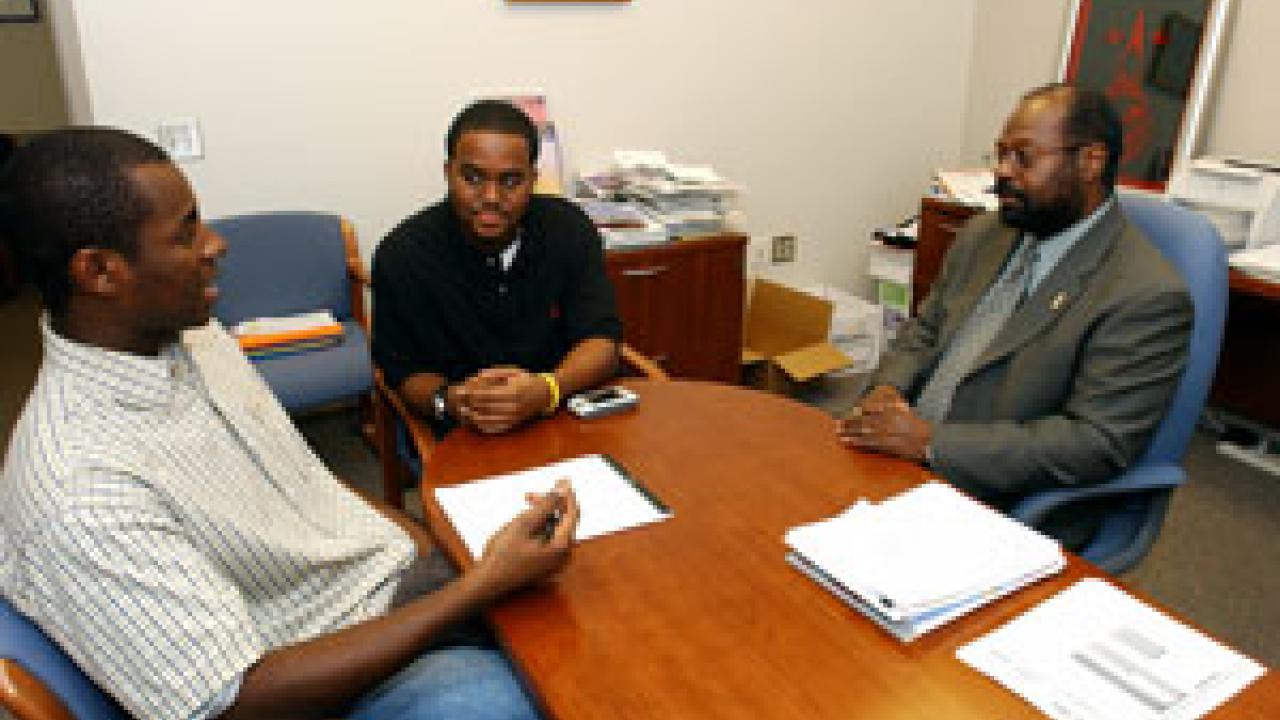On the eve of Picnic Day 2004, riot conditions broke out in Sterling University Vista Apartments in East Davis. Party-goers threw beer bottles at police as officers attempted to quiet the rowdy gathering, estimated at about 1,000 people. Some complex residents were "swarm-robbed" by groups who pretended to need help, then pushed into apartments and stole property. Pepper spray and more than 30 officers were needed to bring the situation under control.
LeVale Simpson, then a junior living in the complex, saw the whole thing. And he was one of 40 to 50 residents who took it upon themselves to pick up brooms and trash bags after the crowd dispersed and sweep away as much collateral damage as possible. "Come Monday morning when the office opened up, you couldn't tell that there had been a situation of any kind," Simpson says. "We addressed a very problematic incident by coming together as common students and residents."
Seven months later, Simpson is in an even better position to mend bad situations. A student assistant to Chancellor Larry Vanderhoef, he is helping to bring an important perspective to the table as vice chair of the City-UC Davis Student Liaison Commission -- a group charged with promoting safe celebrations and easing tensions between students and law enforcement officers locally.
The 20-member commission meets the first Wednesday of every month.
"This is a big coalition," says Simpson, who works out of the Student Affairs Office in Mrak Hall. "We're all consolidating our efforts. Everyone has something to be gained from a better relationship between students and the city. Students do take pride in the Davis community."
Student Brian McInnis, ASUCD director of external affairs and an original member of the commission's safe celebrations subcommittee, agrees. "Everyone benefits from this collaboration," he says. "If we don't collaborate, it becomes 'Us against Them.' "
Besides Simpson and McInnis, other commission members include graduate students Steven Worker, chair of the commission; and Nick Tooker; Professor Sharman O'Neill of plant biology; Captain Steve Pierce of the Davis Police Department; Sherry Richter of the Davis Cham-ber of Commerce; Davis City Council members Don Saylor and Steven Souza; and John Whit-combe of Tandem Properties, which operates more than a dozen apartment complexes in Davis.
Getting everyone to get along
Simpson says the liaison commission has been focusing its efforts on breaking stereotypes. Members hope that more positive interactions between students and police will break down barriers that keep students from seeing police as normal people who are "here to help and work with students," he says. "We're trying to find ways to incorporate police into students' lives so they see the police in another light."
To foster positive interactions, the commission has discussed ideas like police ride-alongs, police procedure education and regular social events that would bring together law enforcement and community members.
City-campus meetings with members of the Davis Residential Managers Association took place in June. Then, in mid-October, Rahim Reed from the Office of Campus-Community Relations, in conjunction with Arnold de la Cruz and the Multicultural Immersion Program, hosted a police forum geared toward opening communication lines between police and students.
The forum was followed by the Nov. 23 Fall Dialogue with the Chancellor, themed "Safe celebrations and police-student relations." Simp-son and Pamela Palpallatoc, the other student assistant to the chancellor, facilitated the event, using feedback and suggestions from the October forum. Ideas discussed included reaching out to freshmen during summer advising, establishing student assistants for university and city police chiefs, reaching out to graduate students, Greek organizations and local bar owners, drafting a memorandum of understanding between students and police, and bolstering communication efforts with an insert in the California Aggie, a door-hanger campaign and ads on the TV at the Memorial Union.
Working toward safe celebrations
After the pre-Picnic Day rowdy party, large parties on May 23 and June 4 also spilled outdoors and spawned fights. The safe celebrations subcommittee has since become an active force in the community. The subcommittee began as a small group including McInnis, Whitcombe, and public-at-large member Norbie Kumagai. Membership has expanded, as have the subcommittee's efforts.
"These were unique situations that had never happened in the city of Davis before," McInnis says. "We wanted to examine them and see if they were the start of a trend."
Members have recently put together a tip sheet telling party hosts how to avoid noise violations by lowering their house's decibel levels. An earlier effort sent commission members to every apartment complex in Davis where they distributed information on open-container laws, DUI violations and social host responsibility. "That was a hands-on effort to promote the safety and well-being of UCD students," says Professor Sharman O'Neill, who recently joined the subcommittee.
Students as problem-solvers
Some say it is the students who are causing the problems with law enforcement. McInnis says he thinks they also can be the solution. "We bring a completely different perspective," he says. "Most of us have just come to Davis with brand new concepts and ideas, and we're ready to implement them. We can contribute something new and fresh."
O'Neill, who works closely with students both on the commission and in the classroom, agrees. "I've been extremely impressed with the students' good judgment, high level of dedication and service to the university," she says. "I find it very refreshing."
Simpson, like so many of his peers, showed his dedication to being a part of the solution that mid-April night when he worked so hard to help correct a bad situation. And, he says, he is willing to continue working hard.
"Both of my parents went to UC Davis, and I've grown up around the community. I want to go to law school here. I'm thinking long term."
Media Resources
Amy Agronis, Dateline, (530) 752-1932, abagronis@ucdavis.edu
